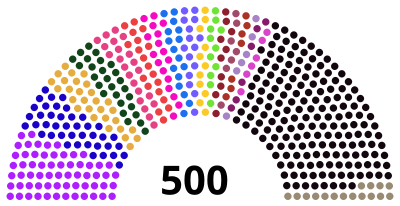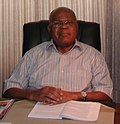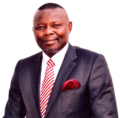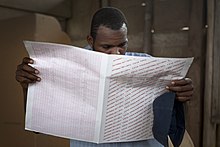Elections in the Democratic Republic of the Congo 2011
In the election in the Democratic Republic of Congo in 2011 was on 28 November 2011 on the President and the Parliament of the Democratic Republic of Congo decided.
After the 2006 election , it was the second election under the terms of a multi-party system in the Democratic Republic of the Congo since 1965. According to official information, the ruling President Joseph Kabila won the election with 48.95% of the vote, while his main opponent Etienne Tshisekedi only won 32, 33% received. The opposition questioned the results and pointed to signs of massive electoral fraud. Tshisekedi declared himself the "real winner" shortly after the election.
Election fraud
The Carter Center spoke of a "lack of credibility" in connection with the elections and described individual results as "impossible". A spokeswoman for the US State Department spoke of "significant shortcomings". The European Union and the Catholic Church also questioned the credibility of the election results.
Individual results leave little doubt about massive electoral fraud. For example, in the Malemba-Nkulu constituency - as in other Kabila strongholds in the Katanga province - 99.46% of the electorate allegedly voted, 100% for President Kabila. With 266,889 votes cast there, such a result is no longer "implausible" but, according to the Carter Center, "impossible". In addition, the results of at least 4,875 voting stations were "lost"; in the Tshisekedi stronghold of Kinshasa alone , this affected around 300,000 votes. Furthermore, around 3,000,000 votes are said to have been registered twice.
Candidates
The four main candidates were:
- Joseph Kabila : The current president was a member of the PPRD (Parti du Peuple pour la Reconstruction et la Démocratie, “People's Party for the Restoration of Democracy”). He was elected in the 2006 elections with 44.81% of the vote to succeed his murdered father, Laurent-Désiré Kabila , who previously held the office of president. The Konrad-Adenauer-Stiftung describes Kabila's popularity among the population as follows in July 2011:
"The popularity of incumbent Joseph Kabila [...] is noticeably dwindling, because people's living conditions have hardly improved in recent years. The country has not come to rest - corruption and mismanagement determine the everyday life of the vast majority. The loyalty of the Eastern Congolese to Joseph Kabila with a view to the elections was therefore by no means certain. "
- Etienne Tshisekedi : The UDPS politician was considered the leader of the opposition in the Democratic Republic of the Congo. It already played an important role in the end of the former Zaire , but lost its influence after the turn of the millennium, as the UDPS was passed over when the transitional government was formed in 2003 and the election was boycotted in 2006. Nevertheless, the party structures were maintained and the party had many supporters in 2011, especially in the provinces of Kasai-Occidental and Kasaï-Oriental as well as Kinshasa . Tshisekedi did the last few years before the elections in Belgium and returned to the Congo in December 2010. He was named a candidate for president at a UDPS party conference.
- Vital Kamerhe : Kamerhe was an employee of Kabila during the 2006 election campaign and was particularly instrumental in ensuring that Kabila won a large number of votes in the provinces of North and South Kivu . He was then President of Parliament and finally gave up this post in March 2009 under pressure from Kabila. In December 2010, Kamerhe resigned from the Kabila party PPRD and founded the UNC (Union pour la nation congolaise) as an opposition party, for which he was a candidate in the election.
- Kengo Wa Dondo : The former Prime Minister and former Foreign Minister has been President of the Congolese Senate since 2007.
Other candidates:
- Jean Andeka
- Adam Bombolé
- François Nicéphore Kakese
- Oscar Kashala
- Léon Kengo
- Antipas Mbusa
- Nzanga Mobutu
- Josué Alex Mukendi
The opposition party MLC , which has so far been most strongly represented in parliament, had not put up a candidate. Due to ongoing legal proceedings, the MLC was unable to re-run for the best-known party member Jean-Pierre Bemba , who received 20.03% of the vote in 2006.
Controversy before the election
Controversies about electoral modalities
In the run-up to the election, there were disputes over a constitutional amendment of incumbent Joseph Kabila, which in the opinion of the opposition clearly favored his re-election. A central component of the changes was the abolition of the runoff election for the presidency, which was approved by the National Assembly on January 12, 2011 and by the state's Senate one day later. With the approval of both chambers of parliament, a candidate in the first ballot now had a simple majority - that is, less than 50% of the votes - to win the election. The opposition would have had to agree on a common candidate in the first ballot in order to have a chance at the presidency.
But it was not only for this reason that some foreign observers doubted the correct conduct of the 2011 election. The United Nations, as independent election supervisors, was also the focus of suspicion, because it did certify that the elections in Ivory Coast had been carried out correctly in 2010 , but it did could not prevent the election result announced by the Opération des Nations Unies en Côte d'Ivoire (ONUCI) from not being recognized by the loser Laurent Gbagbo and the situation worsening in the government crisis of 2010/2011 . A similar trend was feared in part for the elections in the Democratic Republic of the Congo. The constitutional amendment was also criticized in the country itself, for example by the Permanent Council of the Congolese Bishops' Conference , which rated it as "hasty and superficial".
On the first weekend in November, Tshisekedi said in an interview with television that he would definitely become president regardless of whether elections were held. Information Minister Lambert Mende then announced that his ministry was examining a complaint for high treason.
On November 23, South Africa surprisingly announced the dispatch of 70 soldiers with six helicopters to work in Lubumbashi , Kolwezi and Kamina . In April 2011, the then head of the electoral commission, appointed by the United Nations, Ahmedou El Becaye Seck , was killed in an airplane crash in Kinshasa under unexplained circumstances. Mathieu Balé Bouah was appointed as his successor.
Violent clashes before the election
In early September 2011 there were violent protests against possible election fraud in Kinshasa. The protesters accused incumbent Kabila of allowing multiple registrations of voters to sway the election in his favor. The electoral commission announced that it had found 20,000 double registrations among the 32 million registered voters.
Violent clashes broke out when Tshisekedi tried to run for president on September 5 in Kinshasa . Tshisekedi was accompanied by around 1,000 of his followers. Clashes broke out as the group passed the headquarters of the PPRD, incumbent Kabila's party. Stones were thrown and cars were set on fire. The following night masked people attacked a building belonging to the UDPS, the Tshisekedis party, with stones and incendiary devices. The opposite headquarters of the Lisanga radio station burned down. The following day, a member of the UDPS died and two were injured in a gun battle. André Kimbuta , governor of Kinshasa, banned all demonstrations during the registration period.
According to the human rights organization VSV, on October 7, a UDPS demonstration in Kinshasa resulted in clashes with two dead and around ten injured. The rally was intended to increase pressure on the election commission to prevent irregularities in the preparation of the election. The event had already been banned by the authorities in advance. According to the SAAM, not only police forces, who were supposed to dissolve the meeting, were involved in the clashes, but also youthful militias armed with machetes.
On October 4, strangers attacked a bus near Fizi and separated nine of the twelve passengers who belonged to the Banyamulenge Tutsi group. Of these, they killed and dismembered seven. Two survived seriously injured.
In early November there were violent election-related clashes almost daily.
execution

The election itself resulted in a violent incident in which about 11 people died. According to Governor Moise Katumbi , gunmen stormed a polling station in Lubumbashi and killed three people. The attackers also died. Several pre-filled ballot boxes were discovered in Kananga . The corresponding polling stations were set on fire and the associated offices were closed. Election day passed quietly in Kinshasa.
The first round of the presidential and national parliamentary elections began on November 27, 2011. The provincial parliaments were scheduled for February 26, 2012, the senators were scheduled for June 13, 2012 and the provincial governors and vice-governors were scheduled for July 12, 2012 . On January 31, 2013, the sector councils and councils of the chief holiday should be elected, on May 19, 2013 the heads of the sectors and city councils. On August 8th, the mayor and deputy mayor were to be elected.
The United Nations provided technical support for the election. The budget of the election was around 830 million dollars (about 610 million euros), of which around a fifth was paid from abroad. There were around 300,000 election workers and around 62,000 polling stations were set up.
Results and reactions
On December 10, the electoral commission announced the victory of Kabila with around 49 percent of the votes cast. Tshisekedi came in second with around 33 percent of the vote. However, the result was not recognized by any of the opposition candidates. On December 16, the Supreme Court nevertheless confirmed the provisional election result of the CENI electoral commission and thus the re-election of Kabila as head of state. The breaches of the election result put forward by the opposition are not sufficient to justify a cancellation.
On December 20th, Kabila was sworn in as president. At the ceremony took Robert Mugabe in part as the only head of state. The Foreign Minister of South Africa, Maite Nkoana-Mashabane, was also present . Belgium's Foreign Minister Didier Reynders canceled his participation at short notice because of doubts about the correctness of the election. The opposition candidates described the swearing-in as invalid.
There were massive riots after the elections. According to Human Rights Watch , security forces killed 24 people between the election date and December 22. Between December 9 and 14, 20 people died in Kinshasa alone.
Result of the presidential election
| candidate | Political party | be right | proportion of |
|---|---|---|---|
| Joseph Kabila | People's Party for Reconstruction and Democracy | 8,880,944 | 48.95% |
| Etienne Tshisekedi | Union for Democracy and Social Progress | 5,864,775 | 32.33% |
| Vital Kamerhe | Union for the Congolese Nation | 1,403,372 | 7.74% |
| Kengo Wa Dondo | Union of Forces for Change | 898.362 | 4.95% |
| Antipas Mbusa | independently | 311,787 | 1.72% |
| Nzanga Mobutu | Union of Mobutu Democrats | 285.273 | 1.57% |
| Jean Andeka | Alliance of Supporters of Congolese Nationalism | 128,820 | 0.71% |
| Adam Bombolé | Independently | 126,623 | 0.70% |
| François Nicéphore Kakese | Union for the Resurgence and Development of the Congo | 92,737 | 0.51% |
| Josué Alex Mukendi | Independently | 78.151 | 0.43% |
| Oscar Kashala | Union for the Reconstruction of the Congo | 72,260 | 0.40% |
| Total (voter turnout 58.81%) | 18,911,572 | 100.00% | |
| Source: CENI-RDC | |||
Distribution of seats in the National Assembly

| Political party | Seats | ||
|---|---|---|---|
| People's Party for Reconstruction and Democracy PPRD | 62 | ||
| Union for Democracy and Social Progress UDPS | 41 | ||
| People's Party for Peace and Democracy PPPD | 29 | ||
| Social renewal movement MSR | 27 | ||
| Liberation Movement of the Congo MLC | 22nd | ||
| United Lumumbist Party PALU | 19th | ||
| Union for the Congolese Nation UNC | 17th | ||
| Alliance for the Renewal of the Congo ANC | 16 | ||
| Alliance of Democratic Federalists AFDC | 15th | ||
| ECT | 11 | ||
| RRC | 11 | ||
| MIP | 10 | ||
| Christian Democratic Party PDC | 7th | ||
| UDCO | 7th | ||
| Congolese Collection for Democracy RCD | 6th | ||
| National Union of Federal Democrats UNADEF | 6th | ||
| National Union of Federalists of the Congo UNAFEC | 6th | ||
| independent candidates | 16 | ||
| Parties with fewer than five seats | 172 | ||
| Total number of seats | 500 | ||
| Source: CENI-RDC | |||
See also
Web links
- Dominic Johnson : Kabila builds on sand. Election campaign in Eastern Congo. In: the daily newspaper . October 25, 2011, accessed on October 25, 2011 (analysis of the election campaign in eastern Congo).
- Dagmar Wittek: "It's almost impossible". Election officer Bouah on the Congo elections. In: Frankfurter Allgemeine Zeitung . November 25, 2011, accessed on November 25, 2011 (Interview with Mathieu Balé Bouah , United Nations Election Commissioner, on the organization of the elections).
- République démocratique du Congo: Élections présidentielle et législatives 28 novembre 2011 REPORT FINAL MISSION D'OBSERVATION ÉLECTORALE DE L'UNION EUROPÉENNE (French)
Individual evidence
- ^ Taz article: Tatort Wahlkommission, December 10, 2011
- ^ Election result in the Congo . Crime scene election commission. taz . December 9, 2112. Retrieved December 10, 2011
- ^ A b Johannes Dieterich: Election fraud angered the Congolese. In: Frankfurter Rundschau . December 12, 2011, accessed December 12, 2011 .
- ↑ a b Taz article "The results are falsified by Simone Schlindwein, December 12, 2012
- ↑ Politics: Criticism of the election in Congo ( Memento from July 17, 2012 in the web archive archive.today )
- ↑ Taz article "Kabila's Wall of Silence" by Francois Misser from January 3, 2012
- ^ Konrad-Adenauer-Stiftung: The calm before the storm? accessed on July 13, 2011
- ↑ taz January 14, 2011: Kabila secures the next election victory
- ^ DR Congo to hold presidential elections on Nov. 27, 2011 . People's Daily . August 10, 2010. (English)
- ^ DR Congo opposition anger over electoral changes . BBC News . January 10, 2011. (English)
- ↑ DRC's opposition bids for a single presidential candidate . Africa Review . February 7, 2011. (English)
- ^ Konrad-Adenauer-Stiftung: Election campaign with dubious means called on February 10, 2011
- ↑ Fides Service: Bishops criticize the constitutional amendment with a view to the presidential election called on May 18, 2011
- ↑ a b Dominic Johnson: Concern about Congo's elections. In: the daily newspaper. November 8, 2011, accessed November 10, 2011 .
- ↑ Dominic Johnson: Troops from the Cape. In: the daily newspaper. November 25, 2011. Retrieved November 28, 2011 .
- ↑ Dagmar Wittek: "It is almost impossible". In: Frankfurter Allgemeine Zeitung. November 25, 2011. Retrieved November 25, 2011 .
- ↑ Clashes in DR Congo over 'voter fraud' . Al Jazeera. September 2, 2011. Retrieved September 8, 2011.
- ↑ Franquois Misser: Manipulation and power struggles. In: the daily newspaper. Retrieved September 22, 2011 .
- ↑ Dominic Johnson: Dead and Injured in Kinshasa. In: the daily newspaper. October 6, 2011, accessed October 7, 2011 .
- ↑ Dominic Johnson: Selected, shot and dismembered. In: the daily newspaper. October 9, 2011, accessed October 12, 2011 .
- ↑ Up to eleven dead in the Democratic Republic of the Congo election In: ORF . November 28, 2011. Retrieved November 28, 2011 .
- ↑ a b Simone Schlindwein: Ballot boxes as big as garbage cans. In: the daily newspaper. November 28, 2011. Retrieved November 29, 2011 .
- ^ Konrad-Adenauer-Stiftung: Election campaign with dubious means called on February 10, 2010
- ↑ CEI: Official Election Calendar 2010–2013, accessed on September 8, 2010
- ↑ Francois Misser: smart cards on the River Congo. In: the daily newspaper. September 30, 2011, accessed September 30, 2011 .
- ↑ Simone Schlindwein: Time to clean up. In: the daily newspaper. November 9, 2011, accessed November 10, 2011 .
- ↑ The Supreme Court confirms Kabila's election victory . ( taz.de [accessed on November 29, 2018]).
- ↑ Joseph Kabila sworn in in the Congo. In: Handelsblatt . December 20, 2011, accessed December 22, 2011 .
- Jump up ↑ killings and arbitrary arrests. In: Neue Zürcher Zeitung . December 22, 2011, accessed December 22, 2011 .
- ↑ Thomas Scheen: Congo Hardly any excesses in Kinshasa. In: Frankfurter Allgemeine Zeitung . December 11, 2011, accessed December 12, 2011 .




